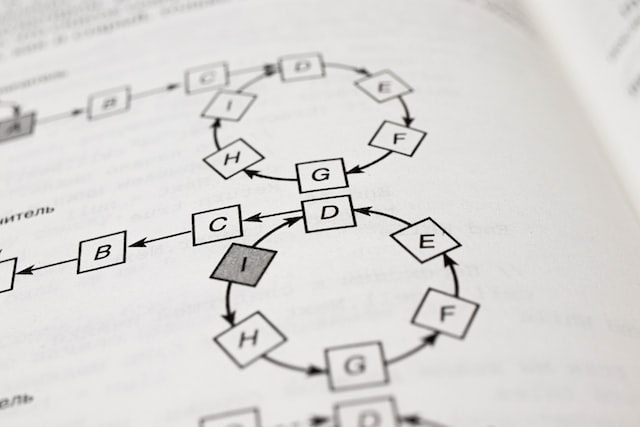Heuristics and algorithms are often used to solve complex problems. While they both strive for the same goal, they operate in different ways. An algorithm is a step-by-step approach which follows a predefined set of instructions while heuristics allows more freedom as it relies on experience and experimentation. Both approaches can be beneficial in their own way depending on the situation at hand.
What are heuristics?
Heuristics are mental shortcuts or rules of thumb that individuals use to simplify decision-making and problem-solving processes. They are mental processes that allow individuals to make judgments and decisions quickly and efficiently, without having to analyze all available information.
Heuristics can be useful in many situations, as they allow individuals to make decisions quickly and with less cognitive effort. However, they can also lead to biases and errors in judgment, particularly when the heuristics are based on incomplete or inaccurate information.
What are algorithms?
(Photo by Андрей Сизов on Unsplash )

An algorithm is a set of rules or guidelines that are followed in order to solve a problem. Heuristics, on the other hand, are more like general tips or tricks that can be used to solve a problem.
Algorithms are usually more specific and can be applied to a wider range of problems than heuristics. Heuristics may be more creative and flexible, but they are also more likely to lead to sub-optimal solutions.
How do heuristics and algorithms differ?
Heuristics and algorithms are both methods used to solve problems, but they differ in how they are used and the results they produce.
Heuristics are general problem-solving strategies that are not always guaranteed to produce the best possible solution, but are usually good enough for most purposes. Algorithms, on the other hand, are more specific sets of instructions that always produce the same result if followed correctly.
Algorithms are typically used for more complex problems where the correct answer is essential, while heuristics can be used for less critical applications where finding any workable solution is more important than finding the best one. In general, heuristics are faster and easier to use than algorithms, but they may not always lead to the best solution.
Examples of heuristics
There are many different types of heuristics, but some common examples include the following:
The take-the-best heuristic: This heuristic suggests that people make decisions by considering only the best option available to them.
The satisficing heuristic: This heuristic suggests that people make decisions by choosing the first option that meets their minimum requirements.
The availability heuristic: This heuristic suggests that people base their decisions on information that is easily accessible to them, even if it is not necessarily accurate or complete.
The representativeness heuristic: This heuristic suggests that people tend to judge something as being representative of a larger group if it shares some characteristics with that group, even if it is not actually representative of the group as a whole.
Examples of algorithms
There are many types of algorithms, but some common examples include sorting algorithms (like bubble sort or quicksort), search algorithms (like binary search), and compression algorithms (like Huffman coding). Heuristics are often used in combination with algorithms to improve the efficiency or accuracy of the overall process. For instance, a heuristic might be used to quickly find a close approximation of the optimal solution to a problem, which can then be refined using an algorithm.
Are algorithms better than heuristics?
There is no right answer to this question as it depends on the particular situation. In general, algorithms are more precise and complete than heuristics, but they can be much more complex and resource-intensive. Heuristics are usually less accurate but much simpler to implement and run. Ultimately, the best approach depends on the nature of the problem and the resources available.
Which algorithms are heuristic?
Heuristic algorithms are algorithms that use heuristics, or rules of thumb, to solve problems or make decisions. These algorithms often prioritize speed and efficiency over accuracy, and are particularly useful in situations where it may be difficult or impossible to exhaustively search all possible solutions.
Some examples of heuristic algorithms include:
- Greedy algorithms: These algorithms make decisions based on the best available option at each step, without considering the long-term consequences of those decisions.
- Simulated annealing: This algorithm is a probabilistic technique for finding good solutions to optimization problems. It involves starting with a large number of random solutions and iteratively refining them over time.
- Genetic algorithms: These algorithms use principles from evolutionary biology to search for optimal solutions to complex problems. They involve creating a population of possible solutions and iteratively selecting the best candidates for reproduction and mutation.
- Ant colony optimization: This algorithm is inspired by the behavior of ants searching for food. It involves creating a virtual colony of ants and simulating their behavior to find the optimal path through a network of nodes.
Overall, heuristic algorithms can be useful tools for solving complex problems quickly and efficiently. However, they may not always provide the most accurate or optimal solutions, and their results should be carefully evaluated and validated.
What is the difference between heuristic algorithm and solution guaranteed algorithm?
There are a few key differences between heuristic algorithms and solution guaranteed algorithms. Firstly, heuristic algorithms do not always guarantee that a solution will be found, whereas solution guaranteed algorithms always find a solution (albeit not necessarily the optimal one). Secondly, heuristic algorithms typically require less time and computational resources than solution guaranteed algorithms. Finally, heuristic algorithms often produce solutions that are close to the optimum, while solution guaranteed algorithm solutions can be much further away from the optimum.
What are the advantages and disadvantages of heuristics over algorithms?
Heuristics and algorithms are both problem-solving strategies, but they differ in several important ways. Here are some advantages and disadvantages of heuristics over algorithms:
Advantages of heuristics:
- Speed: Heuristics are generally faster than algorithms because they require less computational resources and can make decisions quickly based on rules of thumb.
- Adaptability: Heuristics are often flexible and can be adapted to different situations and problems, whereas algorithms are usually designed for specific tasks.
- Simplicity: Heuristics are often simpler and easier to understand than algorithms, making them more accessible to non-experts.
Disadvantages of heuristics:
- Inaccuracy: Heuristics are prone to errors and biases because they are based on incomplete or imperfect information.
- Limited scope: Heuristics may not be applicable to all situations or problems and may not provide optimal solutions in all cases.
- Lack of transparency: Heuristics may be difficult to explain or justify, making it difficult to understand how decisions were made.
Advantages of algorithms:
- Accuracy: Algorithms are designed to provide optimal solutions and minimize errors.
- Reproducibility: Algorithms can be repeated and reproduced with the same results, making them more reliable than heuristics.
- Transparency: Algorithms are often more transparent and easier to explain than heuristics, making it easier to understand how decisions were made.
Disadvantages of algorithms:
- Complexity: Algorithms can be complex and difficult to understand, requiring significant computational resources and specialized knowledge to implement.
- Inflexibility: Algorithms are often designed for specific tasks and may not be adaptable to different situations or problems.
- Speed: Algorithms may be slower than heuristics because they require more computational resources and may involve exhaustive searches of all possible solutions.
Heuristics are generally faster, more adaptable, and simpler than algorithms, but may be less accurate and have limited scope. Algorithms are more accurate, transparent, and reproducible, but may be more complex, inflexible, and slower than heuristics. The choice between heuristics and algorithms depends on the specific problem and the trade-off between speed, accuracy, and complexity.
Why do people problem solve with heuristics instead of algorithms?
There are a few reasons why people might prefer to use heuristics instead of algorithms when problem solving. For one, heuristics can be faster and more efficient than algorithms, since they focus on finding a good enough solution rather than the perfect solution. Additionally, heuristics are more flexible than algorithms and can be applied to a wider range of problems. Finally, heuristics are often more intuitive and easy to understand than algorithms, which can make them more user-friendly.
What are the types of heuristics?
There are several types of heuristics, or rules of thumb, that people use to simplify decision-making and problem-solving. Here are some common types of heuristics:
- Availability heuristic: This heuristic involves making a judgment based on how easily examples come to mind. For example, if you hear about a plane crash on the news, you might assume that flying is dangerous, even though statistically it is much safer than driving.
- Representativeness heuristic: This heuristic involves making a judgment based on how closely something matches a prototype or stereotype. For example, if you meet someone who is quiet and introverted, you might assume that they are also intelligent, even though there is no necessary connection between those traits.
- Anchoring and adjustment heuristic: This heuristic involves starting with an initial estimate or “anchor” and adjusting it based on additional information. For example, if you are asked to estimate the population of a city and are given an initial estimate, you might adjust your estimate based on whether the initial estimate seems high or low.
- Confirmation bias: This heuristic involves seeking out information that confirms one’s pre-existing beliefs and ignoring information that contradicts them. For example, if you believe that a particular diet is effective, you might seek out articles and testimonials that support that belief and ignore evidence to the contrary.
- Satisficing: This heuristic involves choosing the first option that meets a minimum threshold of acceptability, rather than searching for the optimal solution. For example, if you are looking for a new apartment and find one that meets most of your criteria, you might choose it rather than continuing to search for a better option.
Overall, heuristics can be useful tools for simplifying decision-making and problem-solving, but they can also lead to errors and biases if used inappropriately. Understanding the different types of heuristics can help people make more informed and accurate decisions.
Featured Image By – Photo by Markus Spiske on Unsplash









